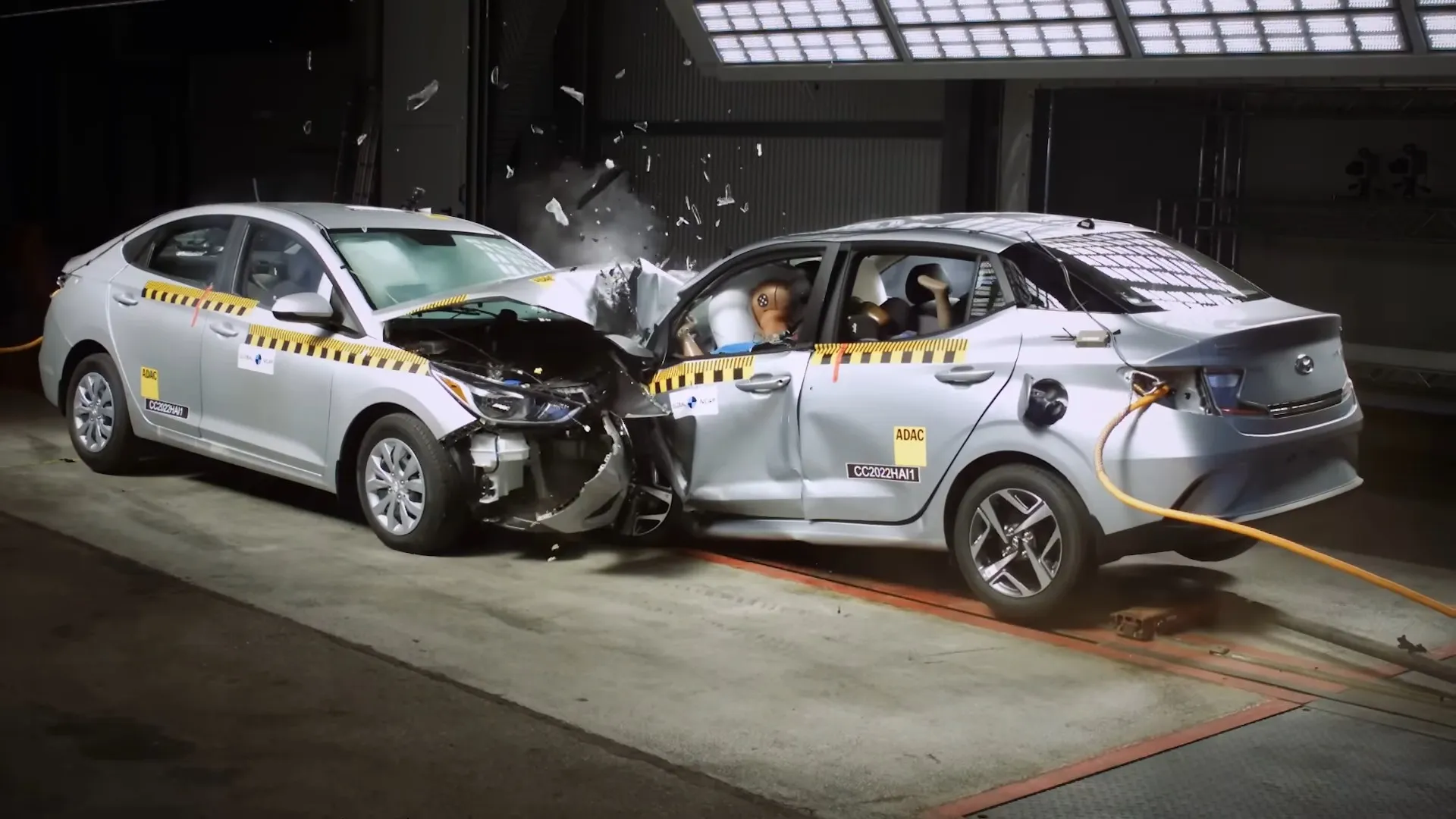FMVSS 201 Occupant Protection Interior Impact Crash Testing
The FMVSS (Federal Motor Vehicle Safety Standards) 201 test focuses on occupant protection during interior impact events in automobiles. This regulatory standard is critical for ensuring the safety of vehicle occupants by assessing the effectiveness of interior components such as door panels, seat backs, and other structural elements.
The test involves recreating a simulated crash scenario where a rigid barrier impacts the driver or passenger side at an angle between 20° to 35° with a velocity typically ranging from 19.3 km/h (12 mph) to 24.1 km/h (15 mph). The objective is to evaluate how well interior components protect occupants by absorbing and distributing energy away from the occupant.
The test apparatus used in FMVSS 201 includes a rigid barrier mounted on a frame designed to replicate an impact angle of approximately 30°. The vehicle under test (VUT) is positioned such that the front or rear seat is impacted by the barrier. For this service, we use specialized crash sleds and sophisticated instrumentation to ensure accurate replication of real-world conditions.
During the testing process, critical parameters are monitored including but not limited to acceleration forces, displacement, and deformation patterns. These data points help determine whether the interior components meet the specified standards for occupant protection. Compliance with FMVSS 201 ensures that vehicles are designed to safeguard occupants in the event of a crash.
Preparing specimens for this test involves ensuring that the vehicle under test is configured as it would be sold to consumers, including all standard equipment and options. This includes verifying that the seat positioning aligns with manufacturer recommendations, and ensuring that any optional interior components are included in the test.
The testing process also requires meticulous data collection and analysis, which involves using advanced software and hardware systems capable of capturing detailed measurements of the crash event. Our team of expert engineers ensures that each parameter is accurately recorded to provide comprehensive insights into the vehicle's performance under FMVSS 201 conditions.
Our laboratory adheres strictly to international standards such as ISO, ASTM, EN, IEC, and others, ensuring that our tests are conducted in compliance with these rigorous guidelines. By doing so, we can provide accurate, reliable results that help manufacturers demonstrate their commitment to occupant safety.
The importance of FMVSS 201 cannot be overstated as it plays a crucial role in protecting drivers and passengers from injuries during interior impacts. This service is essential for automotive manufacturers aiming to meet regulatory requirements and ensure the highest level of safety for their vehicles.
- Ensures compliance with FMVSS 201 standards
- Replicates real-world crash scenarios accurately
- Uses advanced instrumentation for precise data capture
- Achieves accurate energy absorption analysis
- Provides detailed deformation and force distribution reports
Industry Applications
The FMVSS 201 test is widely used in the automotive industry to ensure that vehicles meet safety standards for occupant protection. This service finds significant application in R&D departments where engineers can iterate on design improvements and validate new materials or structural configurations.
Quality managers rely on this testing to verify that production vehicles conform to regulatory requirements, thereby reducing the risk of non-compliance penalties and enhancing brand reputation. Compliance officers use FMVSS 201 results to ensure ongoing adherence to legal standards, while procurement teams can leverage these tests to select suppliers who meet stringent safety criteria.
Automotive manufacturers also utilize this service during product development phases to identify potential hazards early in the design process. By incorporating FMVSS 201 into their testing protocols, they can refine designs and materials to enhance occupant protection without compromising on performance or aesthetics.
The FMVSS 201 test is particularly beneficial for manufacturers of luxury vehicles, high-performance sports cars, and electric vehicles (EVs). These segments often push the boundaries of safety features and innovative design elements. The rigorous nature of this test ensures that even advanced technologies are thoroughly evaluated in terms of occupant protection.
For suppliers of interior components such as seat frames, door panels, and structural reinforcements, FMVSS 201 provides a critical benchmark for quality control. By participating in this testing process, suppliers can demonstrate their commitment to safety and innovation while gaining valuable insights into areas where improvements are needed.
Why Choose This Test
This FMVSS 201 test is essential for automotive manufacturers and suppliers who aim to meet regulatory requirements and enhance occupant safety. Here are some compelling reasons why choosing this service is beneficial:
- Regulatory Compliance: Ensures strict adherence to FMVSS 201 standards, avoiding potential fines and legal issues.
- Data Accuracy: Leveraging advanced instrumentation for precise data capture ensures reliable results that can be trusted.
- Risk Mitigation: Identifies potential hazards early in the design process, allowing manufacturers to refine designs and materials effectively.
- Brand Reputation: Demonstrating commitment to occupant safety enhances brand reputation among consumers.
- Innovation: Provides insights into areas where improvements are needed, enabling continuous innovation within the industry.
- Supplier Selection: Helps manufacturers and suppliers select components that meet stringent safety criteria.
- Performance Validation: Validates new materials or structural configurations against real-world crash scenarios.
- Compliance Assurance: Ensures ongoing adherence to legal standards, providing peace of mind for compliance officers.
By choosing this FMVSS 201 test service, automotive manufacturers and suppliers can ensure that their vehicles meet the highest safety standards while also gaining valuable insights into occupant protection.





